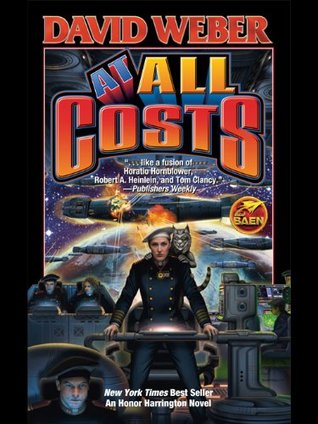Today I'm looking at the eleventh book in the Honor Harrington series, At All Costs. As with a lot of the other books as I've progressed through the series, this book is considerably longer and I think part of it is simply bloat. I found at least a few examples of stuff thrown into the book which probably could have been left out or trimmed down without losing too much of the book. There's also more of the subplots from elsewhere in the Honorverse getting woven into the main story and I'm suspecting I probably should have gone to read those side stories as well because they're starting to seriously affect the main storyline. I remember when Mesa and Manpower had first been introduced to me, having just read the main Honor Harrington books and it felt a little out of nowhere that there was this whole additional plotline.
With as long and occasionally bloated as this book feels, though, this book spends a lot of time making things happen. Which isn't to say that the other books didn't have major events, but I feel like this was a major turning point in the series because the Maticore-Haven conflict is getting resolved while the Manpower and Solar League plotlines are becoming more important. I'll have to see if my feelings about the series are right as I continue.
Usual warning to my kind and gentle readers. I will try to discuss the book in as spoiler-free a manner as possible, but as I'm eleven books in it's difficult to talk about a book intelligently without mentioning some spoilers. If you wish to avoid them please leave now.
One of the things I was honestly a little on the fence about was the awesome space battles. I think this book, more than any other in the series, has had the most space battles in it. And that's part of why I was all for this series in the first place. Give me a bunch of ships with missiles and lasers and I'll be pretty darn happy. Unfortunately, the space battles in this book start getting really repetitive after a while. I noticed in particular that Dave has this really bad habit of going through the number of missiles in a salvo, which bloats his description of the battle by a considerable amount. Seriously, a lot of the battles include a passage where Dave says, ''The Manticorans launched so many thousands of missiles. This number of them were decoys. This number of them were recon pods. But this many were live warheads. Haven countermissiles took out this many. Point defense took out this many. This number lost target lock and wandered off. This many missed. And this many hit the enemy ships. And then the enemy ship exploded.''
Like, I appreciate that he's going through the effort of making the battles as detailed and realistic as possible, but at the same time I really didn't want to hear Dave prattle off a bunch of numbers as well. And this happens at least three or four times in the book, possibly more because I honestly lost count. The result was it made the battles feel a lot longer and a lot less interesting to me, which I thought was a shame because it was the space battles that had me interested in the book in the first place.
As I said, there are also major plot developments in the rest of the book. For example there's the Manticore-Haven war which starts up again, then heads towards another peace negotiation, and then turns into a shooting war again and after the events of this book, I suspect they'll have no choice but to agree to a ceasefire, but it's hard to say. And, as I mentioned, there's the plot involving Manpower and how they apparently are involved much deeper than anyone would expect.
I do wish that the Manpower plot had been introduced and expanded on more in the main books. I'm sure I can go hunt down the supplemental books to find out about the genetic slave trade, all the horrors involved with it, and the grand galactic schemes the board of Manpower has going on, but since it's affecting these books I wish I'd had more of an introduction.
Otherwise, I think this book was pretty good. The series is definitely different from when I started with On Basilisk Station, but I'm still enjoying the series and eager to continue reading it.
- Kalpar


No comments:
Post a Comment